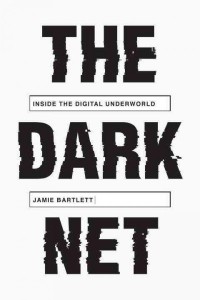 There are huge chunks of the Internet that can’t be found with your standard web browser. Criminals, anarchists, and trolls use encryption-enabled browsers to conduct their business anonymously in these dark corners of the net. In this fascinating Fresh Air interview, author Jamie Bartlett talks about his experiences in the dark net.
There are huge chunks of the Internet that can’t be found with your standard web browser. Criminals, anarchists, and trolls use encryption-enabled browsers to conduct their business anonymously in these dark corners of the net. In this fascinating Fresh Air interview, author Jamie Bartlett talks about his experiences in the dark net.
npr.org/sections/alltechconsidered/2015/06/03/411476653/infiltrating-the-dark-net-where-criminals-trolls-and-extremists-reign
Tag: privacy
Many people believe that privacy is a thing of the past. It’s true that our networked world makes it harder to keep secrets. But there are many things you can do to protect your privacy online. This Huffington Post article clearly outlines some quick fixes you can make in a few minutes.
Facebook made lots of headlines a few months ago when people discovered that their news feeds had been manipulated for research purposes. Many people were shocked that they’d been unwitting participants in massive social science studies. But similar research at Facebook has also been used to help the company to determine how to best help customers deal with unwanted posts. This Radiolab program explores the light and dark sides of Facebook’s gigantic social engineering projects.
www.radiolab.org/story/trust-engineers/
The digital technology explosion of the last decade has produced many new threats to our privacy, including some unexpected ones. In this short TED talk, Catherine Crump explains how the automatic license plate scanners used by police might have disastrous ramifications for law-abiding citizens.
[ted id=2149]
 Predicting the future isn’t easy—especially when it’s coming so fast. But people still try. Which of these expert predictions about the Internet’s future ring true to you?
Predicting the future isn’t easy—especially when it’s coming so fast. But people still try. Which of these expert predictions about the Internet’s future ring true to you?
huffingtonpost.com/2014/03/11/heres-what-the-internet-c_n_4943051.html
Most of us have an uneasy relationship with big databases: We take advantage of the convenience and freedom they bring to us, but we don’t really like the fact that they know so much about us. Singer/songwriter Vienna Teng captures the tension that exists between those contradictory feelings in her beautiful, slightly chilling Hymn of Acxiom. We’ve included a YouTube video with the song’s recording as well as links to an article telling the story behind the song, and a page with lyrics. All three are highly recommended.
Vienna Teng Sings about Surveillance in ‘Hymn of Acxiom’
Lyrics for ‘Hymn of Acxiom’
Key words: databases, big data, privacy, surveillance
Icon: crosscurrents
 Edward Snowden made a decision that changed the world. By leaking top secret government documents to the press, he revealed that US surveillance of private and public citizins goes far beyond what most of us had previously imagined. Because of those leaks, people all around the world are asking important questions about the balance between privacy and security in a free society. In a chilling statement to the BBC, Snowden claimed that he’d accomplished his mission by raising those questions. What do you think?
Edward Snowden made a decision that changed the world. By leaking top secret government documents to the press, he revealed that US surveillance of private and public citizins goes far beyond what most of us had previously imagined. Because of those leaks, people all around the world are asking important questions about the balance between privacy and security in a free society. In a chilling statement to the BBC, Snowden claimed that he’d accomplished his mission by raising those questions. What do you think?
theguardian.com/world/2013/dec/24/edward-snowden-channel-4-christmas-day-message
MIT Professor Sherry Turkle has been studying the human impact of digital technology for decades. In her book Alone Together and in this Fresh Air interview, she talks about how texting and social networking are profoundly changing the way children, teens, and adults live, think, and feel. There’s plenty to think about here.
npr.org/2012/10/18/163098594/in-constant-digital-contact-we-feel-alone-together
The concept of sharing is everywhere on the Internet. In this thought-provoking Huffington Post blog post, Bianca Bosker asks whether Facebook and other companies are using the term to manipulate our feelings and extract information from us.
huffingtonpost.com/bianca-bosker/the-insidiousness-of-sharing-why-we-share_b_1728550.html
If you’re tired of ads now, just wait ’til your smart phone gets a little smarter. It may soon deliver sales pitches to you based on your location, the weather, nearby friends, the contents of your last Facebook post, or just about anything else it can link to you. As your privacy slips away, your cash becomes an easy target for savvy tech companies.
huffingtonpost.com/bianca-bosker/the-age-of-continuous-consumption_b_1833454.html